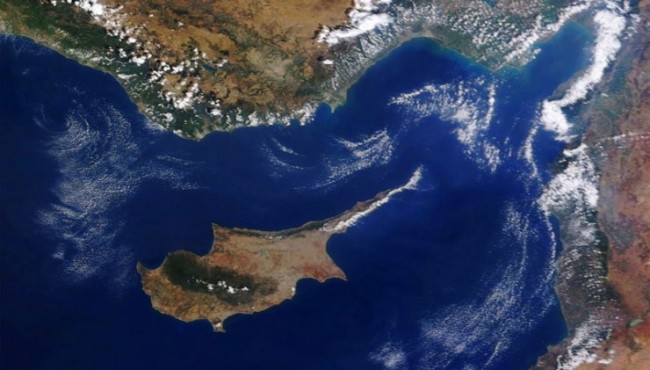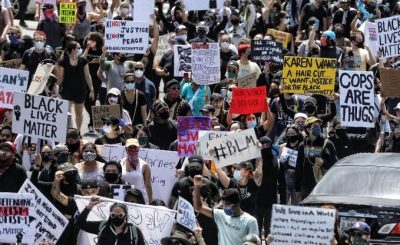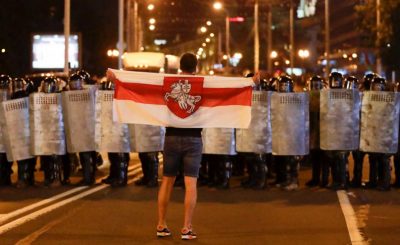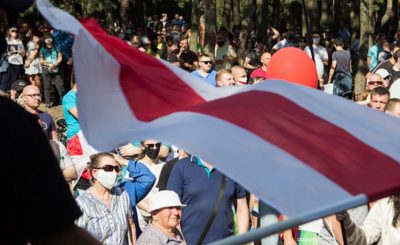Cyprus, imperialism’s island which never sinks and a stronghold of the oligarchy
From occupation to annexation?
Who will solve the problem?
These days Cyprus is going through the 24th anniversary of the “intervention for peace” of July 20, 1974, whose name evokes memories of tension and a crisis which has not been out of the headlines for some time. These include the S-300 missile crisis, the opening of a military base in Baf, news about the closure of gambling dens and the opening of new ones on Cyprus and finally the first visit by a prime minister of Turkey to Cyprus 24 years after the occupation of part of the island.
From UN representatives to US presidents and the governments of Turkey and Greece, right on to the speokesmen of Turkey and Greece on the Cyprus question, there has been much talk of “solutions for Cyprus”, “justified hopes” etc. Those who are actually causing the problem are the ones trying to solve it. But nothing is being resolved anywhere, on the contrary, problems are constantly being aggravated and are continually plumbing new depths.
From occupation to annexation
A phase has started in which the bourgeois media write headlines like “a historic step involving the Turkish Republic of Northern Cyprus”, or “we are firm with regard to Cyprus”, or other ways are expressed in which it is clear that plans are afoot to annex Cyprus. This is going so far that it is no longer necessary to dial internationally to make a phone call to Cyprus from Turkey. How will this phase develop? Will Cyprus become the 80th or so province of Turkey? Or will it develop into an independent state?
It is not actually possible to come up with an answer to this question from the latest developments. The reason for this uncertainty comes from observing just how the “discussion of the Cyprus question” is proceeding.
That the discussions about the Cyprus question are largely empty and artificial is confirmed even by the undoubtedly fascist and chauvinist writer Rauf Temer, who called these discussions hackneyed and artificial, discussions which were heated up and served anew every year. Cyprus is a pawn in the oligarchy’s game, a pawn which is pushed back and forth in chess games with the USA, the European Union and Greece. So if the pawn is pushed forward, this is of no significance.
Even if the oligarchy’s mouthpieces talk again and again about “unification”, it is not really possible to do this in opposition to imperialism. On the other hand, an apparently independent Cyprus suits the oligarchy better. The superficially independent island serves the oligarchy as a contra-guerrilla stronghold and as a paradise for illegal financial transactions.
The Cyprus of the Susurluk state
The Susurluk state’s ties with Cyprus through casinos are becoming increasingly obvious. Just after the Susurluk accident, the intermeshing of contra-guerrillas and the casinos came to light. Well-known figures in the Susurluk state like Mehmet Agar (former police chief, justice minister and finally interior minister of Turkey, who had to resign after Susurluk), Necdet Menzir (former police chief), Orhan Tasanlar (former police chief of Ankara, later on Istanbul, and now a member of parliament for Bursa), Mesut Yilmaz (current prime minister of Turkey), Sedat Bucak (member of parliament in the DYP or True Path Party, one of the ruling parties at the time of the Susurluk accident, in which he himself was injured) and Tarik Ümit (mafia chief on the wanted list), all were heavily involved with the casinos or else moved in the same circles as others who were.
The contra-guerrillas launder money in banks and casinos in Cyprus and dredge up new resources for contra-guerrilla operations and for those who carry them out. It even became known that Mehmet Agar’s driver and the wife of Tarik Ümit were among the owners of a Cyprus bank. But contra-guerrilla activities in Cyprus are by no means restricted to the laundering of dirty money. The island is used as a base for civil fascists. Also on Cyprus there are plots and chauvinist attacks, even “murders by persons unknown” have been carried out there against revolutionaries and democrats opposed to the system. An example of these attacks was the murder of the democratic journalist Kutlu Adali who was investigating contra-guerrilla activities on the island. At the moment efforts are being made to turn Cyprus into a centre of gambling dens while casinos that have been closed down in Turkey are being moved to Cyprus. There are no less than 19 casinos for the 150,000 inhabitants of the Turkish Republic of Northern Cyprus, and 11 of them are owned by citizens of the Republic of Turkey.
From the “island of pirates” of the Ottoman Empire to the “contra-guerrilla island” of the oligarchy
Cyprus was occupied and plundered numerous times in its history. Rulers of Assyrian, Mycenean, Egyptian, Persian and Roman origin all took turns running the island. The strategic importance of the island for trade in the Mediterranean caused all destructive and plundering states to cast greedy eyes on Cyprus. So Cyprus fell into the hands of the Arabs and the English, and for a time it was even ruled by a king of Palestine who had been overthrown. In the 13th century it was ruled by Venice and about two centuries later it was occupied by the Ottomans.
The island’s Turkish population dates back to this period of Ottoman occupation. The 20,000 Ottoman soldiers sent to the island at the time constituted the advance guard of the Turks on Cyprus. The Ottomans used the island as a base for their pirates who launched attacks as far as the Middle East, North Africa and Europe while trying to turn the Mediterranean into an Ottoman sea.
Three centuries of Ottoman rule ended when Cyprus passed to the control of England. This was in 1878. The Ottoman state was crumbling away. The English sought to profit from the situation which arose from the high indemnities the Ottomans had to pay to their opponent in the recent war, Russia, after signing the Treaty of San Stefano (today Yesilköy near Istanbul). As surety for guaranteeing Ottoman territory in Asia, the English demanded the use of Cyprus as a base. They were granted suzerainty over the island, but when the First World War broke out suzerainty was transformed into complete control.
After the Second World War the current problems of Cyprus arose. After the war, all the balances in the world shifted. The peoples of the Soviet Union and Eastern Europe fought and defeated fascism, struggles against imperialism all over the world were on the rise and socialism’s prestige was high. The liberation struggles of the Arab peoples in the Middle East shook French and British imperialism to their roots. Middle Eastern oil grew more important and imperialism gazed hungrily on the region. In this situation there was talk of an independent Cyprus.
Cyprus came onto our country’s agenda in the 1950s, at the same time as neo-colonial relations with imperialism developed. The Democratic Party (DP) was in power. Sedat Semavi used the headline “Cyprus is Turkish” in his newspaper Hürriyet as the start of a campaign to whip up chauvinism and turn attention to Cyprus. The timing was interesting: at that point Greece was supporting the right of self-determination for the peoples on the island. On the other hand, imperialism was founding bases in various parts of the world to ward off socialism. And imperialism needed Cyprus in the strategically important Mediterranean.
Recognising the right to self-determination, resulting in independence, would have taken the island out of imperialist hands, at least to some extent. So it was suddenly remembered that there were two peoples on the island and Turkey put itself forward as the protector of the Turks living on the island. In this way imperialism sowed enmity between the two peoples and in dividing the island it implemented the well-known policy of “divide and rule”.
Dividing it two ways was not enough, imperialism also sought to divide the Greek people. On the one side were forces who wanted an independent Cyprus to protect the island from neo-colonialism. These circles, the fairly strong communist party AKEL, other left-wing groups and the Orthodox Church, represented the actual wishes of the people. On the other side was the fascist EOKA, which wanted a “greater Greece” and supported “enosis” or union with Greece. Under the leadership of Archbishop Makarios the first group defended the unity and independence of Cyprus while the Greek fascists under Grivas made the blood of both Turks and Greeks flow as a result of their armed actions. At the international level there were the independent and socialist countries who defended the peoples’ right to self-determination, and there were the NATO countries who wanted to make Cyprus a base for waging war.
One of the “1,000 operations”: the events of September 6 and 7, 1957
While the Cyprus question was being discussed at international level, imperialism sought to find its own solution. It was concerned by involvement in the Middle East and the approaches by the Arab peoples to the peoples of Cyprus were worrying developments for imperialism. So a conference was held in London in which Greece and Turkey were represented, but it ended without result.
Then Turks from Cyprus held a protest demonstration in London. Two days later there were banner headlines in the Istanbul Express newspaper that there had been a bomb attack on the house in Salonika, Greece where Atatürk was born. Istanbul was turned upside down. The “Cyprus is Turkish” association held a mass demonstration in Taksim Square in Istanbul. Before long the demonstration turned into an attack on ethnic minorities living in Istanbul. Tens of thousands of people surrounded and destroyed the shops, houses, places of worship and cemeteries of minorities, starting in Istanbul’s Beyoglu district and spreading elsewhere.
Later it came to light that a member of Turkey’s national intelligence service had carried out the bomb attack. Parliament did not even consider it necessary to investigate the brutal attacks on minorities and covered up the events. It used the opportunity to declare a state of emergency in Istanbul, Ankara and Izmir and censored the press.
The events on September 6 and 7, 1957 are a typical example of contra-guerrilla operations. Hostility among the peoples is sown through this and similar actions like the one later in Maras (1978). Besides, the wave of chauvinism also serves to prepare the way for attacks on the revolutionary movement in the country.
Imperialism whips up the “Cyprus question”
From now on, imperialism concentrated more heavily on Cyprus. It did not scruple to use every kind of provocation and massacre. At the same time it persisted in trying to have a state on Cyprus that it could control. All the contra-guerrilla methods served this end. For this purpose various conferences were organised and treaties signed. While England, Greece and Turkey received the right to intervene in Cyprus, the island’s right to independence was obstructed. Particularly in the 1960s, pro-independence views worried imperialism. So it supported chauvinist policies in Cyprus and aided attacks by EOKA. At the same time it secretly egged on Turkey to make threats to intervene in Cyprus. Cyprus has become an important base serving imperialism’s interests in the Middle East. The tension in Cyprus gave legitimacy to imperialism’s military presence in the region.
Imperialism the main enemy of the peoples
While the Cyprus crisis was rumbling on, a fascist junta took power in Greece on April 21, 1967. Just like the junta in our country it was under the leadership of the CIA. For the people of Greece it was the start of seven years of torture, arrests and massacres.
The officers of the junta did nothing but seek to destroy any friendship between the peoples and uphold the domination of imperialism. The repression and the policies of the junta made problems in the eastern Mediterranean escalate. The colonels’ regime gave General Grivas in Cyprus full authority to act without any need to consult the Greek government in Cyprus. Through this directive, which ultimately stemmed from US imperialism, the Greek dictatorship was successful in turning the Greek and Turkish people in Cyprus against each other. One massacre followed after another. Under these conditions, the armed forces of Turkey intervened on July 20 and 24, 1974 under the slogan “Intervention for Peace”, and this ended with military occupation. The occupation of Cyprus by the troops from Turkey was one of the factors which contributed to the collapse of the junta in Greece, because the Cyprus policy of the Greek junta had been shown to be bankrupt. But of course this was not the reason why Turkey intervened in Cyprus!
On the contrary, the rulers of Turkey and Greece worked hand in hand to prevent progressive developments which contributed to the achievement of independence. Now half the island was under military occupation. The massacres carried out in the name of an “intervention for peace” poisoned relations between the two peoples almost past the point of no return. After the occupation the island was turned more and more into a contra-guerrilla base. So , for example, the central units of the contra-guerrilla Özel Harp Dairesi (Turkish: Special Warfare Department) were trained in Cyprus. Henchmen of imperialism like the generals Orhan Kilercioglu, Sabri Yirmibesoglu (a well-known contra-guerrilla theorist) and Kenan Evren (later on the leading figure in Turkey’s 1980 military coup) all directed contra-guerrilla activities personally while training in Cyprus.
Imperialism could comfortably use the Susurluk state as gendarmes against the peoples of the Middle East through the contra-guerrilla activities in Cyprus. In this regard it offered help. The Susurluk state could use the island for its drug trafficking which could no longer be concealed. Cyprus is one of the staging posts through which narcotics reach Europe from Afghanistan and Pakistan.
Cyprus as a tool of internal politics
The governments of both Greece and Turkey are past masters at diverting attention towards artificially created “problems” whenever they themselves are in difficulty. Especially in periods when elections are looming, points are scored by putting Cyprus on the agenda. Hostility to other peoples is whipped up, and they are blamed for unemployment, hunger and misery to head off protests against imperialism and oligarchy. Another method is to use repression against the opposition in one’s own land. A chauvinist mood is created through talk of crisis and war, and in this way economic and democratic demands by the people can be postponed or crushed underfoot. Those who stand for the rights of the people are denounced as traitors to the fatherland and thus neutralised. The oligarchies in Turkey and Greece use this tactic against the people on an ongoing basis. Cyprus is raw material for nationalist demagogy, a kind of aspirin the oligarchies in both countries take. Whenever they have a headache, inflammatory statements appear in the newspapers and the “crisis” starts to boil again like a kettle.
The only solution is an independent, united and democratic Cyprus
The Turkish and Greek people lived for centuries in harmony on Cyprus. Hostility began when the island was used by imperialism and by oligarchies. This is the most convincing proof of the need for an unremitting struggle against imperialism and in defence of fraternity among the peoples. Today the Turkish and Greek people are seriously prejudiced against each other, but these prejudices are not so strong that they cannot be overcome. A joint struggle is the basis for overcoming them. Turkish revolutionaries defend the independence of the island against imperialism and its unity based on the free will of its peoples. The second part of the People’s Constitution deals with this subject. Under the heading “National independence and the fraternity of the peoples are indispensible principles for the Republic”, the following is written:
“Article 8: We keep our distance from all policies which cause aggression in international relations or are likely to stir up hostility between the peoples and threaten internal and external peace. Our basis is a policy which furthers the fraternity, friendship and solidarity of the peoples.”
“With all countries, starting with neighbouring ones, we will develop ties based on equality, respect and friendship, which serve the interests of our country and theirs.
“Article 9: We keep our distance from views which produce or stir up hostility between the peoples of Turkey and Greece. The basis of this is seeking a life of fraternity and friendship.
“Article 10: A basis for an independent and democratic Cyprus in which the Turkish and Greek people can live together in fraternity is to be promoted. A solution to the Cyprus question is to be striven for on the basis the peoples’ right to self-determination.”
The liberation of all the peoples in our region depends on putting an end to the influence of imperialism. The struggle going on under the leadership of the Front against imperialism and oligarchy is the struggle of the Armenian, Greek, Laz, Cherkess, Arab, Turkish and Kurdish people, the struggle of all the people in the region.
Source: Kurtulus, Number 92, August 1, 1998




